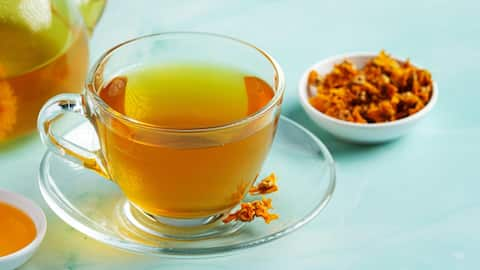Introducing yellow tea: A unique and healthy beverage
What's the story
Yellow tea, a Chinese specialty, has captured the world's attention with its fruity and unique aftertaste, silky texture, and delightful scent. Its vibrant yellow hue comes from a technique called "sealed yellowing," which involves oxidizing tea polyphenols (catechins) and treating them to maintain the color and aroma of the dried leaves. Packed with antioxidants, yellow tea offers numerous health advantages and a gentle energy lift due to its low caffeine content.
History
Historical significance
Yellow tea boasts a rich history dating back over a thousand years, with its origins deeply intertwined with Chinese tea culture. Legend has it that yellow tea was initially produced as a tribute tea during the Tang Dynasty (618-907 AD), reserved exclusively for emperors and dignitaries due to its exquisite nature. Making yellow tea is a labor-intensive and delicate process that requires great skill. Thus artisans made yellow using high quality leaves for the Imperial court.
Preparation
How is it prepared
After an initial withering and firing similar to green tea, the leaves undergo a sealing. During this phase, the leaves are carefully covered in a damp cloth or paper, encouraging a slow oxidation process that imparts the tea's distinctive yellow hue and mellows its flavor. The final steps involve further drying and shaping, resulting in a tea that boasts a nuanced and refined profile, with notes ranging from floral and sweet to a smoother, less grassy taste than green tea.
Heart-health benefits
Yellow tea's heart-healthy properties
Abundant in polyphenols, yellow tea helps guard against heart disease. They further strengthen the endothelial cells' antioxidant defense, which further supports heart health. Furthermore, polyphenols have anti-inflammatory qualities that enhance heart health and guard against heart conditions linked to inflammation. Flavanols are a significant group of chemicals found in yellow tea that have the ability to decrease harmful cholesterol levels.
Weight loss assistance
Weight loss and liver health advantages
For overweight individuals, yellow and green tea extracts significantly decrease body weight, lower body mass index (BMI), and enhance satiety. Consuming polyphenols inversely affects obesity and body weight in older adults, potentially reducing heart disease risk. A diet rich in polyphenols is also suggested as a possible remedy for non-alcoholic fatty liver disease. Yellow tea aids in preventing fatty liver development.
Other benefits
Cancer prevention and other benefits
Yellow tea contains bioactive compounds that fight oxidation and inflammation, reducing cancer risk and acting as antioxidants to support cancer prevention. It has been discovered that yellow tea supplements can alleviate symptoms associated with type-2 diabetes. Moreover, the antioxidants and polyphenols in yellow tea may ain in treating gastrointestinal issues such as peptic ulcers, diarrhea, inflammatory bowel disease, and digestive tract malignancies.
